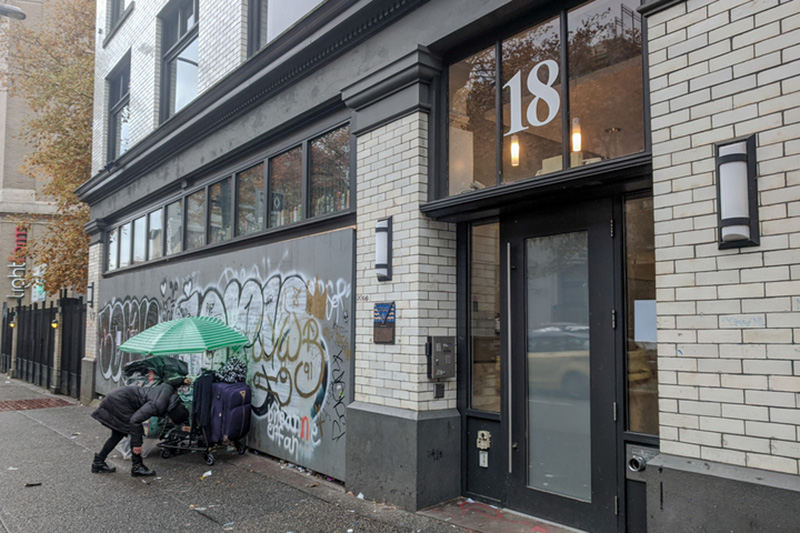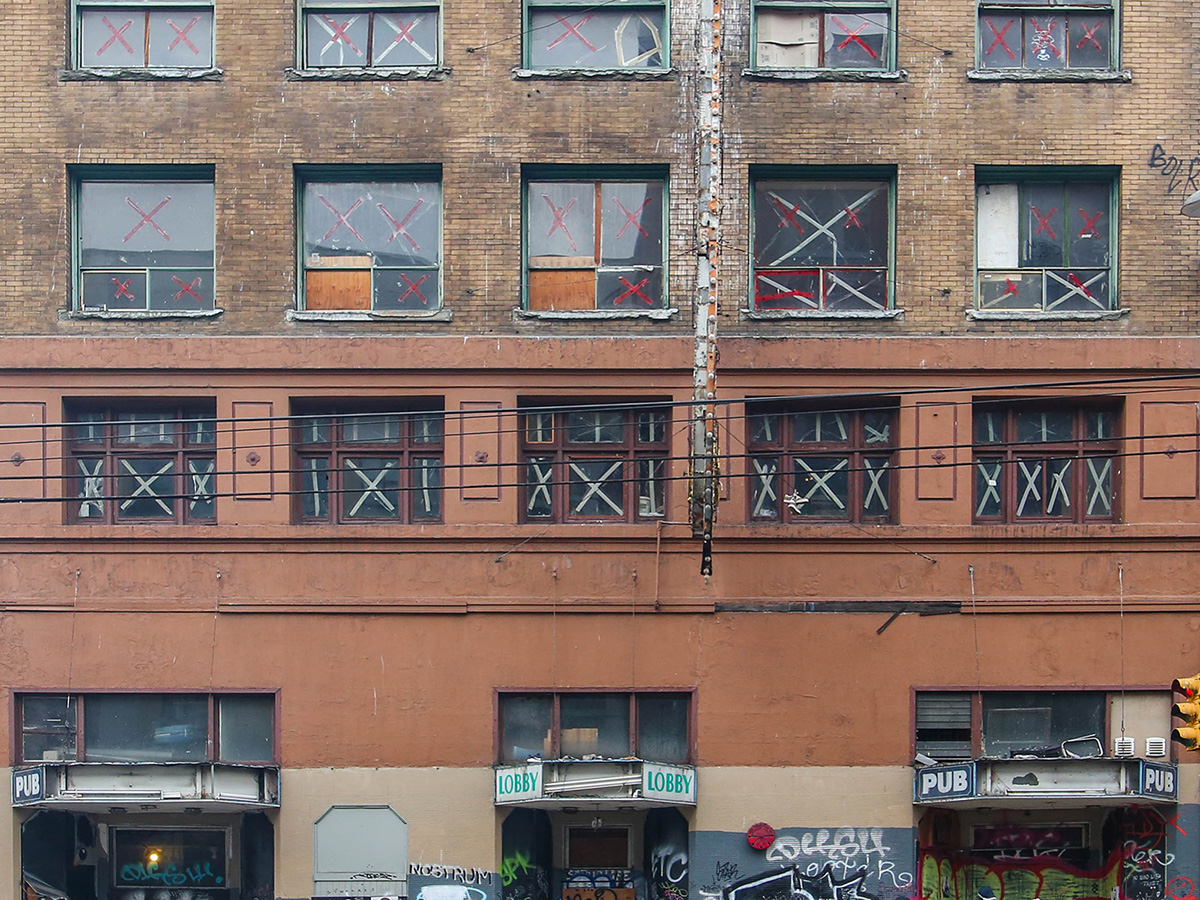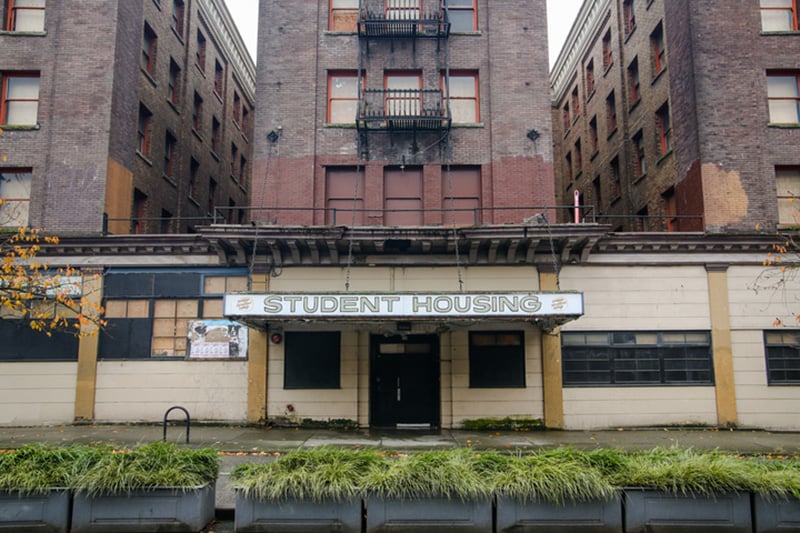Alycia Williams has lived in single-room occupancy hotels in the Downtown Eastside for the past three years. The first year, she lived in a building owned by a company called Living Balance and paid $930 a month for a room with a shared bathroom and no kitchen.
Today, that same room rents for $1,200, Williams said.
Williams now lives in another SRO building, the May Wah Hotel in Chinatown. The rent is much lower, for around the same quality.
“I’ve been at the May Wah Hotel for around a year, and the only notable difference between these two rooms is about $500,” Williams told Vancouver city council on Oct. 8.
Williams said she’s been inside many other SROs in the Downtown Eastside.
“Without a big-time rejuvenation, I’m not sure how long these buildings can hold on,” Williams said. “Many of these buildings have huge bug problems, rodent infestations, bad plumbing, windowless rooms and just generally undesirable living conditions.”
Vancouver’s SRO hotels, concentrated in the Downtown Eastside, Gastown and Chinatown, house many of the city’s poorest and most vulnerable people. Many of the buildings are over 100 years old, and feature tiny 100-square-foot rooms, shared bathrooms and shared kitchens.
Around half remain privately owned. But over the past two decades, tenants have been repeatedly evicted because the buildings are in such poor repair — and the city says many of those evictions have been illegal.
Rents for around 950 rooms have skyrocketed as buildings have been sold to investor-landlords who have often done minor renovations and raised rents on rooms advertised as “micro-suites.” Around 900 rooms in what the city considers the worst buildings have lower rents, but multiple building violations, while another 1,820 rooms are at risk of gentrification.
At the same time, B.C.’s social assistance “shelter rate” — the amount single people are provided for rent — has been stuck at $375 for years. Average rents for SRO rooms are well above that level, but still provide too little revenue to allow private landlords to operate and maintain the buildings.
The rapid loss of SRO units has reduced Vancouver’s stock of housing for low-income people, even as the city and province spend millions to create new housing to get people out of homelessness.
Jill Atkey, CEO of the BC Non-Profit Housing Association, has warned that for each new affordable housing unit being built in B.C., three are lost to real estate speculation and redevelopment.
“We’ve been really focused on the roll out of new (housing) supply and building the case for new supply,” she said. “Unless we’re also paying attention to what’s happening to our existing stock, we’re not going to be able to dig ourselves out of this hole.”
But after more than 15 years fighting against illegal evictions, gentrification and unsafe conditions, advocates say a new plan for SROs that city council adopted on Oct. 15 is providing hope during a particularly dark time.
Wendy Pedersen, a member of the SRO Collaborative representing tenants, was set to go to city hall to fight what she thought would be an inadequate attempt to protect Vancouver’s dwindling stock of low-income SRO buildings from further gentrification.
But Pedersen said she ended up ripping up the speech she had prepared and writing another one — because the plan city staff presented included everything she and tenants had been asking for.
After years of seeing the city fail to protect tenants from eviction and rising SRO rents, Pedersen called the plan a “watershed moment.”
The plan that city council voted to approve will see the city work to acquire 105 SRO buildings for low-income housing, “bringing them into government ownership and safeguarding them as social housing,” according to city staff’s report to council. The city will have to partner with the provincial and federal government to find the $1 billion needed to buy and renovate the buildings, many of which are in terrible condition.
Under the plan, city staff will also explore how the city can tie rent control to the unit rather than the tenant. That would mean that SRO owners would no longer have an incentive to evict tenants or pressure them to leave in order to be able to raise rents dramatically.
Tenant advocates have been calling for this form of rent control, called vacancy control, for years. But the provincial government has been strongly opposed, based on fears that vacancy control could make developers unwilling to build new rental buildings.
Vancouver asked the provincial government to implement vacancy control for SROs, but was told no. Now city housing planners will look at using municipal powers to put vacancy control in place and will consult with tenants and landlords of SRO buildings. They’ll report back to council by the end of June 2021.
“If we can get that in place, that’s going to save hundreds of people from homelessness,” Pedersen said of the city’s move towards vacancy control.
Decades of lost SRO housing
The new plan comes after decades of inadequate efforts to protect SROs by the city.
In 2003, Vancouver passed a bylaw that regulated the demolition and conversion of SRO rooms. If building owners are ordered to repair their buildings, but fail to comply, the city’s Standards of Maintenance bylaw gives the city the power to do the repairs and bill the owner.
But it’s a tool the city has never actually used, according to Pedersen.
Despite those measures, illegal evictions have happened over and over again, and advocates and tenants have repeatedly criticized the city for standing by while buildings fell into terrible disrepair. In some cases, buildings are still sitting empty — in a city where over 700 people sleep on the street every night.
Instead of ensuring buildings are maintained, “the city and the police and the fire department just shut these places down,” Pedersen said.
Examples include the Burns Block at 18 W. Hastings St., where tenants were given just a few hours to leave after the fire department inspected the building in March 2006 and said it was unsafe because fire exits had been blocked. After the building was emptied, the owner sold it and it was redeveloped by Reliance Properties, with the 270-square-foot rooms renovated into "micro-suites" with tiny bathrooms and space-saving features like built-in cupboards and Murphy beds.

When the building reopened in 2011, city councillors with Vision Vancouver, a party that had promised to end street homelessness, heralded the redevelopment as affordable housing for workers who were being squeezed out of downtown Vancouver.
Units currently rent for $1,700 to $2,500.
All the tenants of the American Hotel were evicted in 2006 in what the Vancouver Sun called an illegal eviction in a 2010 story. Tenants of the Clifton Hotel were illegally evicted in 2014, according to Vancouver city staff. Today, the Clifton at 1125 Granville St. still sits empty, while the American was recently bought by BC Housing.
Dunsmuir House at 500 Dunsmuir St. has been empty since 2013, when residents were relocated and a BC Housing lease wasn’t renewed because the building needed so much work, according to Vancouver city staff. The building is owned by Holborn properties, the company that developed the Trump Tower and has been criticized for being slow to replace more than 200 units of social housing it demolished in 2009 in a complicated deal involving the Little Mountain site.
The Regent and the Balmoral on East Hastings Street, owned by the Sahota family, were considered to be the city’s worst SROs, but they also housed hundreds of residents, both as official tenants and unofficial guests.
For years, Pedersen and a group of tenants pushed the city to step in and do repairs to the two buildings, even launching a class action lawsuit that took aim at the city for failing to enforce its own bylaw on minimum maintenance standards. But the fight ultimately ended with the court case lost and the buildings shut down in 2017 and 2018 by the city.
While the tenants were relocated to other buildings, Pedersen believes the closures of the buildings contributed to a rise in homelessness in the Downtown Eastside.
The Regent and the Balmoral — a total of 332 rooms — now sit empty as the city attempts to expropriate them. It’s the first time the city has ever tried to expropriate a property because the owner failed to take care of it, and the owners are still challenging the attempt in court. The city says the court proceedings are currently adjourned “as the City is working with representatives of the owners of the Regent and the Balmoral to resolve the expropriation of the hotels.”

Meanwhile, ever-rising land prices have made SRO buildings attractive to real estate investors. Peter Marlowe, an SRO resident, told council that after buildings change hands, it’s common for impoverished tenants to be offered a few hundred or a thousand dollars to move out.
Allison Dunnet and Monika Czyz, housing planners for the City of Vancouver, estimate there are just 77 SRO rooms left in the city renting at the welfare shelter rate of $375.
For the thousands of other tenants paying $600 or $700 or more, rent takes away money for food and other necessities.
Dunnet and Czyz said it’s been clear for some time that the Single Room Accommodation bylaw was no longer effective against the market forces that were making buying SRO buildings attractive.
“Some of those rooms, with a kind of lipstick renovation with some paint and some new fixtures, they can run upwards of $1,200, $1,300, $1,400,” Czyz said.
Housing planners will also be looking at whether Vancouver’s empty homes tax should apply to empty SROs.
“The way we’ve been directed by council to look at extending the empty homes tax, it’s very much in the same principles of how the empty homes taxes is working and was intended city-wide,” Dunnet said.
“To ensure that people are not holding housing that could be opened and used and lived in — and just holding it on a speculative basis.”
The pandemic and SROs
The COVID-19 pandemic illustrated just how poor SRO housing is. Tenants are unable to self-isolate because they have to share bathrooms and kitchens, raising the risk that the virus could spread through buildings where many residents have pre-existing health conditions.
The city responded by developing a close working relationship with the SRO Collaborative, and providing cleaning supplies, food and personal protective equipment to tenants.
Pedersen says the SRO Collaborative has been focusing on organizing tenants and helping them develop the skills needed to advocate for themselves. Ultimately, the SRO Collaborative wants to see tenants, not non-profit housing providers, run the buildings acquired through the $1-billion fund.
“Our goal is to have tenants be written into future housing agreements as a governing body,” Pedersen said.
And the number of buildings the city has identified — 105 — means that the city has its eye on acquiring buildings that have already been gentrified, Pedersen said. The city says there are currently 99 privately owned SRO buildings in the city.
Even though many of the SRO buildings are very rundown, Atkey says the city’s acquisition plan is good value for money when compared with the cost of people being homeless.
The buildings and land will become publicly owned, meaning governments will be able to redevelop the sites in the future. The BC Non-Profit Housing Association is pushing for a similar acquisition plan to be rolled out across the province to safeguard existing affordable rental housing.
Although land in downtown Vancouver is more expensive than other areas of the city, Atkey said it was important to support the existing community of people who live in the SROs.
“It’s not a question of ‘OK, we’ll purchase land where it’s less expensive and move people out of where they currently consider home,’” she said. “That’s just not an equitable solution. The buildings here are important because people live in them, and their lives matter.” ![]()
Read more: Housing, Municipal Politics
















Tyee Commenting Guidelines
Comments that violate guidelines risk being deleted, and violations may result in a temporary or permanent user ban. Maintain the spirit of good conversation to stay in the discussion.
*Please note The Tyee is not a forum for spreading misinformation about COVID-19, denying its existence or minimizing its risk to public health.
Do:
Do not: